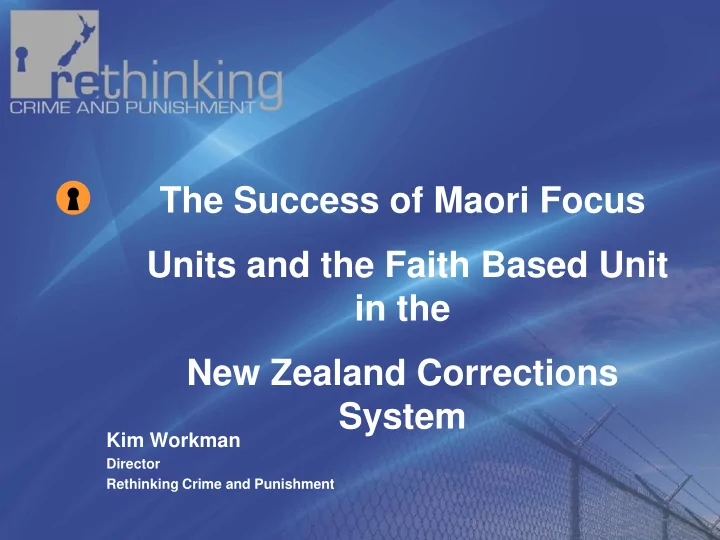

The Success of Maori Focus Units and the Faith Based Unit in the New Zealand Corrections System Kim Workman Director Rethinking Crime and Punishment
About Science, Culture and Spirituality • A traditional “scientific” worldview is inadequate to explain art, culture and spirituality. When it comes to those things we must use other ways of knowing.. • Lawrence Leshan and Henry Margenau, • “Einstein’s Space and Van Gogh’s Sky: Physical Reality and Beyond”.
Imprisonment as Rehabilitation • “There is also another dangerous influence at work and that is the proposition advanced by some people who work in and around the prison system that good can come out of imprisonment; that it can be an important method of changing the behaviour and attitude of those who are sent there, so that they will come out better people and much less likely to commit crime as a result of their experiences in prison.” • Professor Andrew Coyle
Defining Success • “ The original intent was to test the effectiveness of the two unit types and see whether they measured up against evidence-based behavioural-cognitive theory. When the new ideas were tested against the department’s favoured ideology, the cognitive behavioural approach to prisoner transformation was found to be wanting .” Kim Workman
Maori Focus Units • Prisons do not transform offenders. The locus for transformational change is within the whanau (family) • Role of Community and Networks pivotal to success • Law versus Lore – the Role of Tikanga Maori • Resistance to the Indigenisation of Tikanga Maori
Maori Focus Units • “Every culture has its own internal logic, coherence and integrity. Every culture has an intertwined system of values and attitudes, beliefs and norms that give meaning and significance to the individual and collective identity.” Amster Reedy •
Faith Based Unit • Moral and Spiritual Development • A Values Based Community • Community Building • Restorative Practise • Engagement with Civil Society
2006 Evaluations • Maori Focus Unit – No identifiable theoretical or empirical basis for development of implementation – Confusion about Role of Tikanga • Principles for ethical and moral guidance? • Framework for social control? • A Customary body of law? • A body of cultural knowledge? – 94% of priosners thought they were there to learn te reo and culture
2006 Evaluations • Faith Based Unit “This evaluation has examined the stories of ex-offenders who showed some aspects of success in the FBU/OJ programme. These stories demonstrate how the FBU and OJ can have a dramatic and positive impact on participants. The stories also show how the support that is offered is comprehensive and ongoing .” • Department refused to publish report
Departmental Response • Both Units became ‘places’ in which programmes were delivered, rather than ‘therapeutic communities’. – MFU’s - Tikanga Maori Programmes – FBU – Christian Programme • CBT principles to be integrated into both units • Maori Focus Unit – Department incorporated CBT approach into MFU • Faith Based Unit – Prison Fellowship proposed intervention logic based on theory of social identity change and resistance theory – Permission denied
“What Works” Review - 2009 • 2009 “What Works Review” - Insufficient research to establish that either intervention reduced re-offending • Evidence for faith based interventions stronger • Both held promise
What was the Outcome? • Maori Focus Units – 2010 Whare Oranga Ake – two Maori self care units developed • Kaupapa Maori Approach • Increased Maori Service Provider involved • Focus on Prisoner Reintegration • $19.8 m over three years • Faith Based Unit – Closes on 28 November 2012
What was Successful? • Maori Focus Units – A Kaupapa Maori Approach to Offender Transformation – Framework Based on Based on UN Declaration of Rights of Indigenous People? • Faith Based Unit – An Offender Transformation Model based on social identity change and desistance theory? – A Human Rights Based Approach to Prisoner Treatment?
Ex- prisoners can regain their citizenship with society’s support
Recommend
More recommend